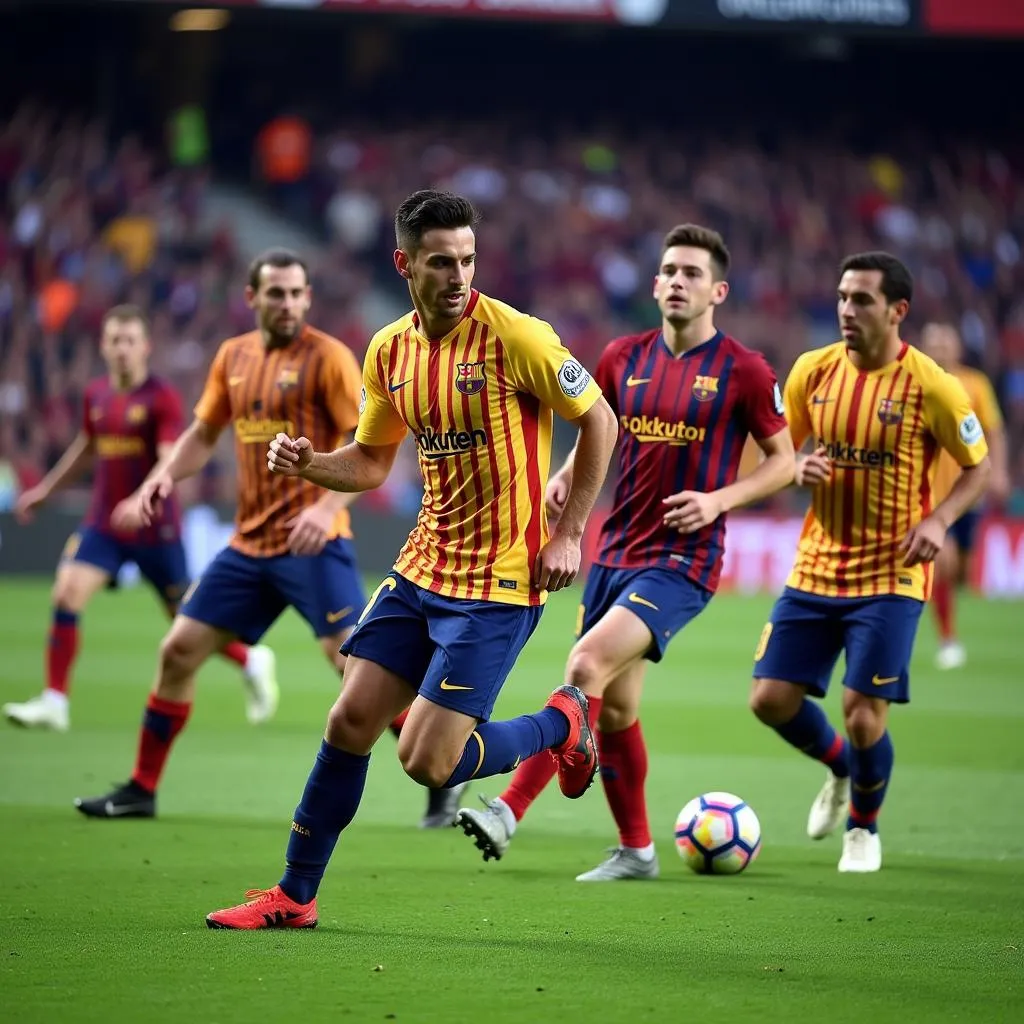The Lethal Rainbow Team: Football’s Most Dazzling Attacking Force
October 9, 2024The term “Rainbow Team” in football often evokes images of vibrant, attacking football, a kaleidoscope of talent capable of unlocking any defense. While the exact definition might remain somewhat subjective, it generally refers to a team renowned for its offensive prowess, often possessing a potent mix of individual brilliance and intricate team play.
One could argue that several teams throughout history deserve the “Rainbow Team” moniker. Still, certain sides have undoubtedly captured the imagination with their attacking flair and tactical fluidity, leaving an enduring legacy on the sport. This article dives into the characteristics that define a “Rainbow Team,” exploring some of the contenders for this prestigious title and examining the tactical nuances that make them so captivating to watch.
What Defines a “Rainbow Team”?
While goals are the lifeblood of any attacking team, a true “Rainbow Team” transcends mere goal-scoring. They embody an attacking philosophy that prioritizes creativity, flair, and an unwavering commitment to entertaining football.
Here are some key characteristics often associated with “Rainbow Teams”:
- Attacking Prowess: At the heart of any “Rainbow Team” lies an insatiable hunger for goals. These teams possess players capable of extraordinary individual moments of brilliance and a collective understanding of how to unlock defenses seemingly at will.
- Tactical Fluidity: “Rainbow Teams” are not confined to rigid formations or predictable patterns of play. They adapt, evolve, and often catch opponents off guard with their tactical flexibility. This might involve seamless transitions between formations, fluid positional interchanges, or the ability to shift the point of attack quickly.
- Unpredictability: A hallmark of a “Rainbow Team” is their ability to keep opponents guessing. This unpredictability stems from their tactical flexibility and the individual brilliance of their players, who can conjure moments of magic out of seemingly nothing.
- Entertainment Value: While winning is undoubtedly the ultimate goal, “Rainbow Teams” understand the importance of entertaining their fans. They play with a certain panache, a swagger that elevates them beyond the ordinary.
Contenders for the Crown: Examining Some of Football’s Most Attacking Sides
Several teams throughout history can lay claim to the “Rainbow Team” title. Let’s delve into a few notable examples:
- Brazil 1970: Widely regarded as one of the greatest teams ever assembled, Brazil’s 1970 World Cup-winning side epitomized the “Rainbow Team” ethos. Their blend of individual talent, exemplified by the likes of Pelé, Jairzinho, and Rivelino, combined with their fluid, attacking style, made them a joy to watch.
- The Netherlands 1974: Led by the legendary Johan Cruyff, the Dutch revolutionized football with their “Total Football” philosophy. Emphasizing positional interchangeability and attacking fluidity, the Netherlands captivated the world with their style despite falling short in the World Cup final.
- Barcelona 2008-2012: Under Pep Guardiola, Barcelona redefined modern football with their tiki-taka style, a possession-based approach that prioritized intricate passing and movement. With Lionel Messi at the heart of everything, Barcelona dominated Spain and Europe, winning countless trophies with their beautiful brand of football.
 Barcelona players passing the ball in a tight space
Barcelona players passing the ball in a tight space
The Tactical Mastermind Behind the Rainbow: The Coach’s Role
The coach of a “Rainbow Team” plays a pivotal role in fostering the environment and implementing the tactical framework that allows attacking talent to thrive. They must strike a delicate balance between encouraging individual expression and instilling a collective understanding of the team’s tactical principles.
A successful “Rainbow Team” coach possesses:
- Tactical Acumen: They can devise strategies that maximize their team’s attacking potential while ensuring defensive solidity.
- Man Management Skills: Handling a squad brimming with individual talent requires exceptional man-management skills. The coach must create a harmonious dressing room environment where egos are kept in check, and the collective good of the team remains paramount.
- A Forward-Thinking Mentality: A “Rainbow Team” coach embraces innovation and constantly seeks ways to evolve their team’s playing style.
Beyond the Trophies: The Legacy of a “Rainbow Team”
While trophies provide tangible evidence of success, the impact of a “Rainbow Team” extends far beyond silverware. Their style of play can inspire a generation of players and fans, leaving an enduring legacy on the sport.
“Rainbow Teams” show that football can be both beautiful and successful. They remind us that the sport, at its core, is a form of entertainment, capable of captivating hearts and igniting imaginations.
 A stadium full of cheering football fans
A stadium full of cheering football fans
Conclusion: The Enduring Allure of Attacking Football
The concept of a “Rainbow Team” might be subjective and open to interpretation. Still, one cannot deny the allure of a team committed to playing attacking, entertaining football. These teams embody the sport’s captivating spirit at its finest, reminding us why we fell in love with the beautiful game. Whether it’s the free-flowing football of Brazil in 1970, the tactical masterclass of Guardiola’s Barcelona, or any other team that has graced the game with its attacking brilliance, “Rainbow Teams” will forever hold a special place in football history. They remind us that football can be more than just a game; it can be a spectacle, a work of art capable of inspiring awe and wonder in those fortunate enough to witness it.
FAQ
What are some other examples of “Rainbow Teams” in football history?
Several other teams could be considered “Rainbow Teams,” depending on the criteria used. Some notable mentions include Hungary’s “Magical Magyars” of the 1950s, the French team that won the 1998 World Cup, and Arsenal’s “Invincibles” of the 2003-2004 season.
Is it essential for a “Rainbow Team” to win trophies to be considered great?
While trophies are a testament to a team’s success, some might argue that a team’s playing style and impact on the sport can be equally important. A team that plays beautiful, attacking football but falls short of winning major trophies can still leave a lasting legacy and inspire future generations.
Can a “Rainbow Team” succeed in modern football, which is often characterized by defensive solidity and tactical pragmatism?
Although modern football has seen a greater emphasis on defensive organization, teams like Guardiola’s Manchester City and Klopp’s Liverpool have shown that attacking football can still be incredibly effective. These teams have found success by combining attacking flair with defensive stability, proving that “Rainbow Teams” can thrive even in the modern game.
Need More Information?
For any inquiries or assistance, please don’t hesitate to contact us:
Phone Number: +84 0396443476
Email: [email protected]
Address: 23 Thang 3 Street, Dak Nia, Gia Nghia, Dak Nong, Vietnam
Our dedicated customer support team is available 24/7 to assist you.